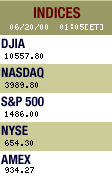| Corporate Financial Healthcare Technology | |
| Stock of the Day Tip of the Day Periscope | |
 for more information | |
|
Japan markets calm after rate hike storm
Bond prices edged lower after the Bank of Japan ended its
zero-rate policy, but traders said this was more due to concerns
that the government would try to compensate by launching yet
another major fiscal stimulus package later this year.
Short-term interest rates were even less responsive to
Friday's 0.25 percentage point rate rise, even though the BOJ
drained a large amount of funds from the money market on Monday
in line with its decision.
Tokyo shares dozed through the day as Japan's traditional
"Obon'' summer holiday started before ending slightly up and
their calm reaction kept the yen supported at around Friday's
levels against the dollar.
"Everyone saw it coming,'' said Kenji Kobata, managing
research director at Ace Securities. "And with shares having
fallen so much since April, investors decided it had been
factored in through the process.''
The Nikkei average ended up 0.23 percent at 16,153.91 with
even rate-sensitive banking and construction stocks taking the
BOJ's dramatic move in their stride.
In late afternoon trade, the dollar was riveted to tight
ranges between 108.58 yen and 108.85, up slightly from 108.49
yen in late U.S. trading on Friday.
SHORT-TERM RATES SLOW TO REACT
The BOJ absorbed funds from the money market three times
during the day, draining a larger-than-expected 2.5 trillion yen
($23 billion) at its 0020 GMT regular operation. It later
absorbed an additional 500 billion yen in the second round and
800 billion yen in the afternoon.
Traders said the huge drainage of funds was an attempt by
the BOJ to push the overnight rate up to its new target of 0.25
percent. In theory, money market rates should rise as the
central bank reduces supply by draining more funds.
The key unsecured overnight call rate briefly rose to around
0.20 percent in early trade, but then drifted down and struggled
to rise again. It was mainly traded around 0.03 to 0.06 percent
in the afternoon from Friday's weighted average of 0.04 percent.
Traders attributed the subdued reaction to the fact that
many fund raisers had already covered their requirements during
the present reserve maintenance period, which ends on Tuesday,
before the BOJ's decision.
"Bank reserves also expanded because the BOJ left a large
surplus in the market on Friday, so despite the BOJ's draining
of funds from the market, the key overnight call rate is
unlikely to rise that much today,'' said Izuru Katoh, deputy
manager and senior market economist at Tokyo Tanshi Co Ltd,
Japan's largest money broker.
Katoh and other money traders said the banks appeared to
have sufficient reserves to last through the end of the current
reserve maintenance period, predicting rates would not start
approaching the BOJ target of 0.25 percent until a new reserve
maintenance period starts on Wednesday.
"It may edge up moderately tomorrow, but it will take a
couple of days, just like what happens to the U.S. federal funds
rate when the Fed hikes rates,'' Katoh said.
Money market dealers were widely expecting the BOJ to
maintain an accommodative supply stance to keep the overnight
rate at around 0.25 percent.
JGBS EDGE LOWER
Other money rates also remained steady, with the focus on
how short-term money rates behave when the new reserve period
begins on Wednesday, traders said.
One-month call rates were traded around 0.27 percent and
overnight rates from the next day traded at 0.20 percent, both
little changed from Friday's levels.
JGB prices edged down but were well-supported as many
institutional investors were eagerly looking for an opportunity
to buy JGBs on price dips.
The market was given fresh cause for concern after Japanese
media reported over the weekend that Prime Minister Yoshiro Mori
said his government may compile an extra budget for the current
fiscal year to help boost the economy.
But long-dated bond prices were expected to stay firm as the
market was not expecting the BOJ to lift interest rates again
for a long time, given Japan's struggling share prices and
uncertainty about the strength of its economic recovery.
JGB futures came under technical selling pressure as many
operators were busy unwinding their positions, which were built
on Friday before the BOJ's credit-tightening.
The key September 10-year JGB futures ended trade at 133.47,
down 0.03 point from Friday, having been down to a low of
133.18. The yield on the key August 223rd 10-year JGB stood at
1.725 percent, up 0.010 percentage point from Friday.
| ||
|
© , Fox Market Wire. All Rights Reserved Sitemap | Terms |